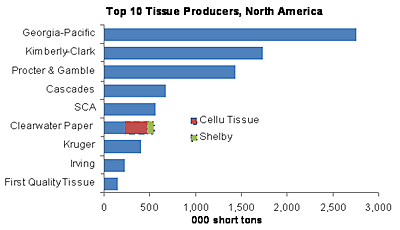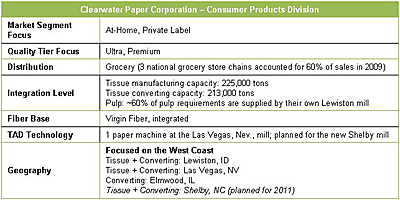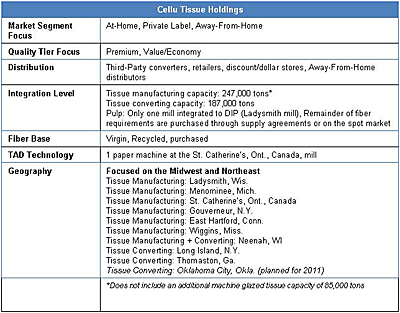
This report on the impact of Clearwater Paper's recent acquisition of Cellu Tissue is the second in an on-going series by Pöyry Management Consulting. The first report in August 2010 issue of Over the Wire-Tissue Edition focused on changing consumer behavior in North American tissue markets. Future monthly reports will explore topics such as capacity build-up in North America, emerging tissue markets, tissue market segments, and much more.
Attractive tissue market fundamentals in North America are enticing key players (and potentially new entrants) to undertake significant growth initiatives. One player in particular has been especially active. Clearwater Paper has not only initiated plans for a new mill in Shelby, N.C., USA, but has also recently announced the acquisition of Cellu Tissue.
This report takes a closer look at the driving forces behind Clearwater’s actions, and also examines the future impacts these actions will have on the tissue market in North America. What competitive response, if any, can we anticipate from other key players?
Clearwater’s Expansion Activities
Formerly a regional powerhouse, Clearwater Paper Corp. has taken significant actions to expand its Consumer Products (tissue) business coast-to-coast. With the acquisition of Cellu Tissue and the planned investment in North Carolina, Clearwater Paper will become the sixth largest tissue producer in North America, surpassing Kruger and Irving and approaching the size of Cascades.

Both strategic initiatives will not only expand Clearwater’s product offering and double tissue capacity, but will also drive significant freight cost savings and solve some logistical problems. With its manufacturing capacity concentrated in the West Coast and a sole converting facility in Illinois, Clearwater Paper has been shipping parent rolls of tissue more than 1,500 miles from its Las Vegas and Idaho mills to support its Illinois operations. By diverting parent roll production eastward, Clearwater has required some external purchases of parent rolls to support its converting operations on the West coast.
Cellu Tissue adds excess manufacturing capacity in the Midwest and Northeast, which should help to supply jumbo rolls to the Illinois facility at a cheaper cost and lessen Clearwater’s dependence on the external supply of jumbo rolls. For example, the distance from the Ladysmith, Wis., mill to Elmwood, Ill., is about 400 miles.
In a second quarter 2010 earnings conference call, Gordon Jones, CEO, noted that "we have papermaking capacity in Lewiston, Id., and also Las Vegas, Nev. That is where our papermaking is. And then of course we buy in some parent rolls of paper to support us too. So when we get that kind of papermaking capacity in the East, we will certainly have those parent rolls of paper much closer to our customer base than they are today. And that should help us a lot on freight savings. We are looking for logistics to help us out a lot."
Market Impacts and Competitive Response
The combination of Cellu Tissue and Clearwater Paper will create a much stronger, larger competitor in the At-Home, premium quality private label tissue market. This transaction makes a strong statement of Clearwater Paper’s strategic intention to be a dominant competitor in this market. Other key competitors, such as First Quality Tissue are also expanding their presence in this market. First Quality is planning to install two new machines in Anderson, S.C, USA.
The private label market is also expected to capture share from higher-cost national brands, and this transaction may cause increased competition for branded-products giants Kimberly-Clark and Proctor & Gamble. Pöyry expects K-C and P&G to continue to focus on the basic versions of their ultra-premium branded products as a competitive response to the growing threat of quality private label products. Conversely, the transaction may be positive for competitors who sell unconverted jumbo rolls to the largely fragmented North American market.
As part of Clearwater, Cellu Tissue (a major supplier of unconverted jumbo rolls) may re-direct its jumbo roll production to Clearwater’s Illinois converting operation and the planned Oklahoma converting facility expected to come online in 2011. Cellu Tissue has been clear about its strategic intention to shift its product mix towards higher-margin converted products. As part of Clearwater, there is no reason to expect that this strategy will change.
In Fiscal 2010 (year ending February 2010), Cellu Tissue sold 133,767 tons of jumbo roll tissue to independent converters, which is significantly less than the 157,917 tons sold in the preceding year. As a result, other jumbo roll suppliers may have an opportunity to fill the gap for the independent converters at risk of losing a supplier.
That being said, even the combined entity is still long on tissue manufacturing capacity, with an estimated 70,000 tons of excess supply, and key changes will need to be made at the manufacturing level to ensure compatibility with converting operations before jumbo roll supply can be diverted internally.


TAPPI
http://tappi.org/